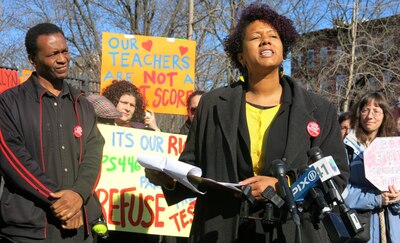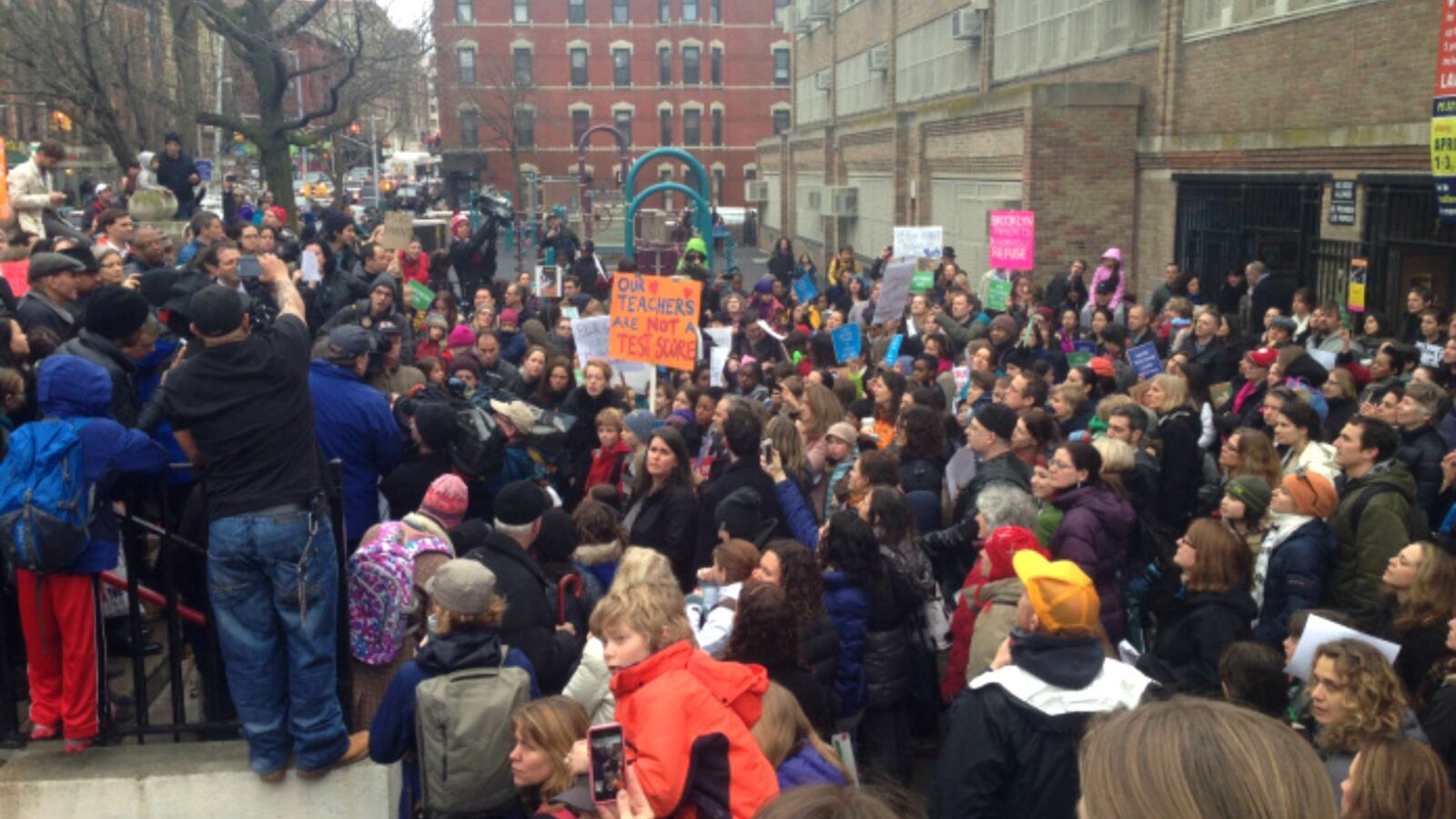As students wrapped up this week’s state English exams, advocates said more city parents than ever refused to let their children take the tests at schools with active “opt-out” movements, while other parents brought the boycott to schools that are new to the cause.
In District 15, Brooklyn’s opt-out hotspot, P.S. 321 saw its refusal rate rocket from about 4 percent last year to 36 percent this year, and P.S. 58 went from one boycotter to 50, parents and teachers said. Meanwhile, in southeast Brooklyn, an area not usually associated with anti-testing fervor, 10 students for the first time handed in opt-out letters at P.S. 203.
“It’s small,” said parent Charmaine Dixon, “but it’s big for us, because it’s never happened before.”
Advocates were still gathering city opt-out numbers Thursday, and while some predicted an increase from last year’s total of about 1,900 families that formally refused the exams, they will still represent a tiny fraction of the roughly 420,000 city test-takers. A spokeswoman said the education department would not have a final opt-out count until the tests, which are given in grades three through eight, are “fully processed.” (Students take the math tests next week.)
The city’s refusal rate will also be dwarfed by the percentages in several suburban and upstate districts, where some reports said the majority of students sat out the tests. Across the state, more than 155,000 students out of about 1.1 million eligible test-takers may have refused this week’s exams, according to an unofficial tally Thursday morning by the group United to Counter the Core, which opposes the Common Core standards and their assessments. Last year, 49,000 students did not take the English tests, according to state officials.
While noting the city’s comparatively small numbers, advocates stressed that the refusal movement has spread outside Brooklyn and Manhattan’s liberal bastions to a smattering of schools in other parts of the city, sometimes despite resistance from principals and teachers. Advocates, parents, and teachers said the growth reflects some parent’s long-standing wariness about the value and validity of standardized tests, which hardened this year after Gov. Andrew Cuomo proposed tying teachers’ ratings even more closely to students’ scores.
They added that some parents decided it was safer to boycott the tests this year following city policy changes that shrank the role of test scores in decisions to promote students to the next grade or admit them to certain middle schools. Still, the advocates acknowledged that the eye-popping opt-out figures from other parts of the state made them reluctant to release their latest citywide counts.
“Part of the apprehension,” said parent and opt-out organizer Janine Sopp, “is that our numbers are not going to be Long Island numbers.”
As some city schools dived even deeper into the refusal waters this year — for example, the Earth School in the East Village went from 52 to 72 percent of students sitting out the exams, a teacher said — others tried dipping in their toes. Nine schools out of 100 that were contacted in the Bronx and Staten Island reported having parents opt out for the first time this year, according to Jody Alperin, a parent member of the group NYC Opt Out. (Not all the schools responded.)
Still, the vast majority of students took the tests. In some cases, parents worried that skipping the exams could keep their children from getting into selective schools. Despite the policy change, middle schools with admission policies can still base up to 49 percent of student rankings on their scores — and some parents fear that scores weigh even more heavily in practice.

Meanwhile, some administrators have warned parents who inquired about opting out that students may have to attend summer school or take different tests, and that schools could lose money, advocates said. And some teachers warned that their ratings could suffer, the advocates added. (Chancellor Carmen Fariña has told principals to explain the value of the state tests to parents, but respect their choice if they decide to opt out.)
At some schools, educators participated in panel discussions or sent letters home in which they openly shared with parents their concern that the state tests do a poor job measuring student growth and teacher effectiveness. But in other schools, educators said they were ordered not to share such views.
After several students in one Bronx classroom opted out for the first time this year, the principal told the teacher she would face disciplinary charges if he found that she had encouraged them to do so, according to the teacher who spoke on the condition of anonymity to avoid retaliation. (She denied urging students to boycott.) Theresa Cardazone, a sixth-grade social studies teacher at I.S. 281 in Brooklyn, said such threats stop some teachers from giving parents even basic information about opting out.
“The parents are not informed,” she said, “and we’re not allowed to give information.”
Teachers who back the opt-out movement have criticized their union leaders for declining to endorse the boycotts, as the state teachers union recently did. While the head of New York State United Teachers recently recorded a robocall telling members that parents have a right to opt out, United Federation of Teachers President Michael Mulgrew warned members at a meeting this week that test refusal could jeopardize the city’s federal funding, according to attendees who said he also affirmed parents’ right to make that decision. (In a statement, Mulgrew said the union shares parents’ concerns about high-stakes testing, and blamed Cuomo’s education policies for the rise in boycotts.)
The city gets about $900 million in federal education funds, and one condition is that at least 95 percent of students in tested grades take the annual exams. If a school or district dips below that threshold, then the state education department must “consider” possible sanctions, one of which is withholding federal funds, officials said. (Advocates said sanctions can only kick in after three years, but a state education department spokesman did not confirm that when asked.)
Spokesman Jonathan Burman said the agency would consider withholding money “in the most egregious cases,” but that any sanctions would be determined on a “case by case basis, taking into account the degree and length of time the district has failed to meet participation rate.” A federal spokeswoman said that agency has never had to withhold money due to the 95-percent rule “yet.”
Jody Alperin, the NYC Opt Out member whose children attend P.S. 10 in South Park Slope, where advocates believe the number of boycotters shot up to 60 this year from one last year, called the talk of sanctions “scare tactics.”
“They’re using semantics,” she said, “to be as scary as they can.”

